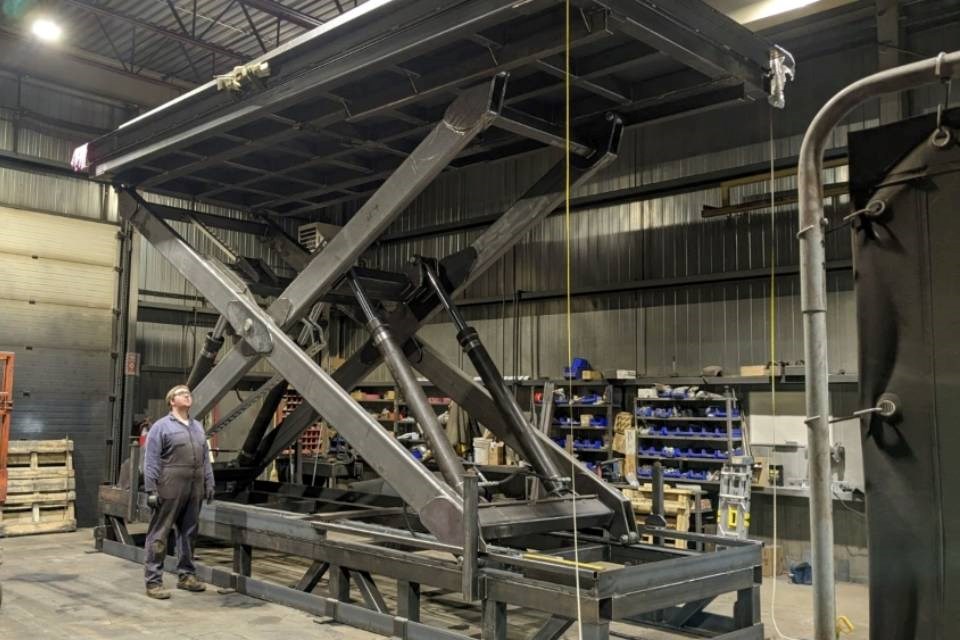THUNDER BAY — In the summer of 2018, Alicia Mayo-White was a few months into a post-graduate human resources (HR) program at Confederation College when a tour of the school’s machine shop stopped her in her tracks.
She had been hired for the summer to work in the HR department at the Thunder Bay college, and part of her job was to help hire new faculty.
Touring the school with a candidate interviewing for the millwright program coordinator position, they poked their heads into the machine shop to check out the space and equipment.
Laid out on the workbenches were a number of fireplaces, all made by current students.
A feeling hit Mayo-White like a lightning bolt.
“I was, like, ‘I’m in the wrong program — who made these’?” Mayo-White recalled. “I just instantly knew.”
Shortly afterward, she switched out of the HR program and into mechanical engineering, a field she knew little about except that it would bring her closer to working on projects like the fireplaces that had grabbed her attention.
At 32 years old, it was an “absolutely terrifying decision” to make a commitment to a three-year program, she said, “but it was worth it.”
“I don’t fully understand where this is going to take me,” she recalled thinking. “But this is where I need to start.”
Growing up in Thunder Bay, Mayo-White liked to play with her creative side; she often thought she would become a costume and prop fabricator for the TV and film industry.
But if you were considered a “smart kid” and got good grades in school, she said, you were urged to go to university over college. She didn’t know much about the trades, although she later learned her grandfather had been a boilermaker.
“Why did no one tell me about this when I was younger?” she said.
After completing three years at Confederation College, she enrolled in the two-year mechanical technician program at Georgian College in Barrie. Because of her experience at Confederation, she was able to move directly into the second year of the program.
When it came time to look for an apprenticeship, she followed in the footsteps of her teacher, who had done his apprenticeship at Thunder Bay Hydraulics. Within about 45 minutes of emailing company president Jamie Crozier, he had called her back.
“He was like, ‘If you are seriously interested in machining, I want to talk to you,’” Mayo-White recalled.
In this highly digital age, it’s more common for new machinists to be drawn into CNC (computer numerical control) machining, which uses a computerized system for the design and fabrication of parts. It’s handy for mass production or the manufacture of repetitive components.
But manual machining, which is used for one-off parts, is Mayo-White’s bread and butter.
“I like interacting with the stuff that I’m making,” she said of what pulls her to that side of the trade.
“I do want to learn everything I can about machining, but the manual lathe will always be the default I love.”
Mayo-White thinks of machining as “making art with math,” in that she’s still being creative, but all within a certain set of specifications.
It’s a lot like playing a videogame, she said, because you have to complete a challenge or quest. The reward is seeing it all come together in a piece of working industrial equipment.
“Even if I didn’t have to do it as a job for the money, I would still want to be a machinist,” Mayo-White said. “I still want to learn this trade, because I find it so fascinating.”
At Thunder Bay Hydraulics, Mayo-White makes hydraulic and pneumatic cylinders that go into everything from scissor lifts to tilt tables and upenders. The company has provided industrial manufacturing and repair services to forestry, mining, and other heavy industrial customers since 1969.

Mayo-White has now been at the company for three and a half years and earned her journeyman Red Seal ticket last July — on her first try. None of the initial excitement about her chosen trade has waned, and she cites the variety of work as a highlight.
Her coworkers range from college grads to veteran tradesmen nearing retirement, with several entering the trade right out of high school.
They and Crozier, her boss, have been very supportive of her and a second female machinist working in the shop. She’s retained her love of teaching from her early HR days, and jumps at any chance to mentor or educate younger women and girls interested in the trades.
Mayo-White often attends activities on behalf of the company, as well as events geared specifically toward attracting women to industry, such as the Jill of All Trades event that Confederation hosted last October.
One of her most impactful experiences took place just before she entered her second year at Confederation.
Each year, the college hosts an orientation session to help incoming students get a sense of what to expect in their coming year. Both students and teachers are invited to speak, and Mayo-White was asked to share her perspective.
Walking into the room, she saw that a recently retired male shop teacher had been replaced by a tradeswoman, and the faces of several fresh young female students sat looking back at her, waiting to start their journey into the trades.
That was when she knew the message was getting through.
“Just the sight of seeing a female teacher amongst all the teachers, and then seeing that there were at least five girls in that orientation that year, it was just a feeling that I can’t explain,” Mayo-White said.
“I was, like, ‘This is amazing. We need more.’ It just made me so happy.”
